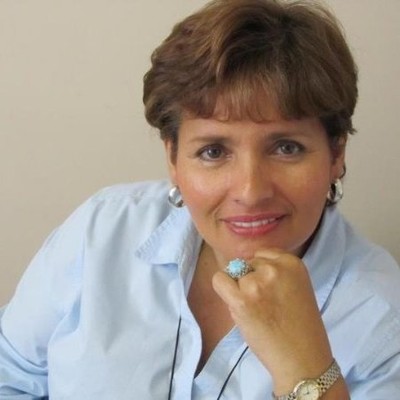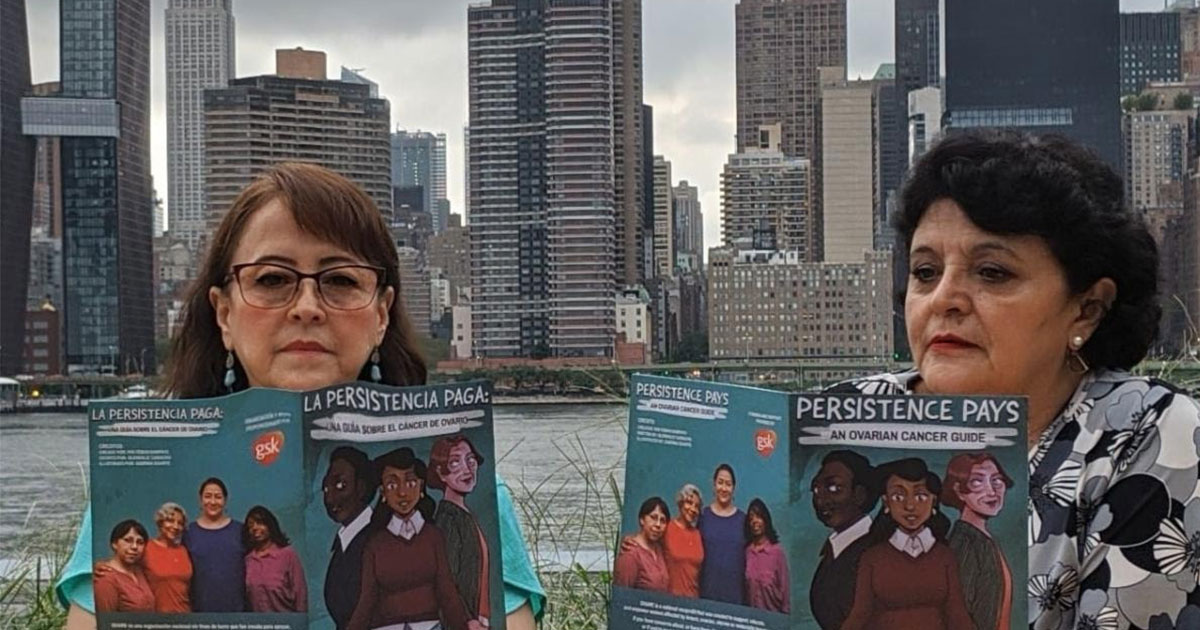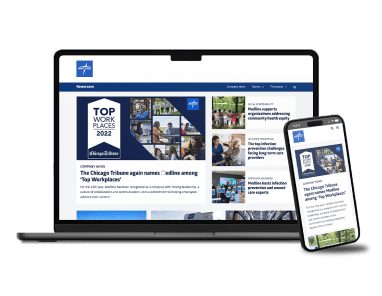Medline Foundation grants help fund breast cancer awareness, outreach and support

By Medline Newsroom Staff | October 31, 2023
Since 2005, Medline has supported community efforts to increase awareness, enhance patient care and improve the quality of life for breast cancer patients, survivors and their families. This year, in recognition of Breast Cancer Awareness Month, the Medline Foundation presented two outstanding nonprofit organizations with grants that help expand access to healthcare for people diagnosed with breast cancer.
SHARE Cancer Support, based in New York City, received the first-ever Pink Glove Grant, a $25,000 award funded through proceeds from Medline’s Pink Sense Nitrile Exam Gloves. The grant recognizes SHARE’s dedication since 1976 to empower, educate and holistically support anyone diagnosed with breast, metastatic breast and now gynecologic cancers.
Through extensive outreach activities in multiple languages, SHARE helps patients as well as the public. They offer expert-led educational programs, in-person peer support groups, national cancer helplines, online communities, and printed and digital materials. “We consider ourselves the voice of the patient, because we’re in touch with patients every day,” notes SHARE CEO and Executive Director Carol Evans. “And for the public, our LatinaSHARE Ambassadors come from the Latina community so they know how to address their specific fears and myths about breast cancer.”
“We consider ourselves the voice of the patient, because we’re in touch with patients every day.”

Carol Evans
CEO and Executive Director
SHARE Cancer Support
Focusing efforts
The Pink Glove Grant will directly help fund SHARE’s LatinaSHARE program. Knowing their community includes many under-resourced breast cancer patients who are monolingual Spanish speakers, SHARE established the LatinaSHARE program almost 30 years ago. It continues to grow as the Latino population in the U.S. continues to grow.
In addition, Latina women are about 20 percent more likely to die of breast cancer than non-Latina white women diagnosed at a similar age and stage, according to the American Cancer Society. “Language is a huge barrier for health access,” Evans says, adding, “We’re serving people who can’t navigate the healthcare system without Spanish being spoken through the whole process.”
“The additional funding will aid in the expansion of our program by enabling us to train additional outreach ambassadors, support group facilitators, helpline volunteers and a new patient navigator, all whom communicate with the people we serve in their native language—Spanish,” says Senior Director of LatinaSHARE Patient Support and Education Jennie Santiago, a cancer survivor. In fact, many SHARE volunteers and staff are cancer survivors, which helps build trust for SHARE’s Spanish-speaking patients and communities.
“We’re really out there interacting with our communities and listening to their needs and thinking of ways to improve our programming in accordance with those needs.”

Jennie Santiago
Senior Director
LatinaSHARE Patient Support and Education
Long-held cultural myths create additional challenges among many Latino families, sometimes keeping women from seeking medical help in a timely manner and sometimes just confusing facts from reality. “I’ve heard this myth a lot: If you get hit in the chest or you bump into something, you will get breast cancer,” Santiago says.
Another “dangerous myth,” Evans says, is that many Latina women think if their mother or maternal grandmother didn’t have breast cancer, they can’t get it. One popular way SHARE sets the record straight is through graphic novels or novelas, written in Spanish and English, telling the story of Latino characters who are facing cancer.
“I think what makes us so different is that we’re really out there interacting with our communities and listening to their needs and thinking of ways to improve our programming in accordance with those needs,” Santiago says.
Evans says the Pink Glove grant is special to them. “It recognizes our work in the Latino community, and it’s so wonderful to shine a spotlight on that.”
Community Impact Grant helps build referral pipeline
Also supporting its goal to advance access to healthcare for all people affected by breast cancer, the Medline Foundation awarded $25,000—one of 11 Community Impact Grants awarded this year—to the Breast Cancer Resource Center (BCRC) in Austin, Texas. BCRC empowers breast cancer patients and families with personalized support and compassion. Medline’s Pink Glove proceeds funded 25% of the BCRC grant.

SHARE novelas in Spanish and English present facts and information about cancer in a more accessible and digestible format
-Photo courtesy of SHARE Cancer Support
An important aspect of the program is the strong partnership they’ve built with community clinics and other healthcare organizations in their five-county area that refer patients to BCRC. The grant will help BCRC expand its reach by providing these healthcare partners with materials, access to educational webinars, videos and more.
In addition, the grant will help fund Certified Patient Navigators who work with their partner healthcare facilities, particularly minority-serving organizations.
“Many individuals from diverse backgrounds encounter financial, systemic and personal obstacles when accessing healthcare,” says BCRC Chief Program Officer Sharyn Malatok, MPA. “For a significant portion of this population, their racial identity, economic disadvantages and limited access to education quite frequently result in poorer health outcomes.”
The BCRC Patient Navigators are breast cancer survivors themselves and enable people with breast cancer and their loved ones to become active and knowledgeable participants in their healthcare. The guidance and education they offer covers the continuum of care, from psychosocial support to the identification of resources to better communication between clients and healthcare staff, including translation services for more than 200 languages. Malatok says, “BCRC is committed to changing the health outcomes for our clients, all of our clients.”
Learn more about how Medline is advancing health equity.
Medline Newsroom Staff
Medline Newsroom Staff
Medline's newsroom staff researches and reports on the latest news and trends in healthcare.


